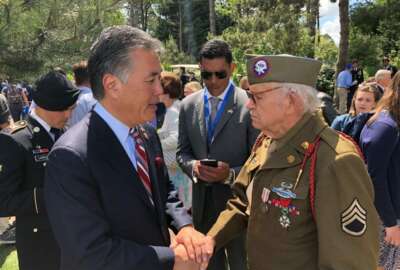
Hubbard Radio Washington DC, LLC. All rights reserved. This website is not intended for users located within the European Economic Area.
Hubbard Radio Washington DC, LLC. All rights reserved. This website is not intended for users located within the European Economic Area.
On Memorial Day, we recall those who didn't return. The tragic pattern of those who return only to take their own lives, that's an ongoing challenge.
On Memorial Day, we recall those who didn’t return. The tragic pattern of those who return only to take their own lives, that’s an ongoing challenge. Federal Drive with Tom Temin talked with a man who says the number of veteran suicides is likely undercounted. He is Michael Carmichael, a 22-year veteran of Army Special Forces and Founder & CEO of Check-A-Vet.
Interview Transcript:
Tom Temin Michael Carmichael, you’ve done some research into this issue and this sadly persistent issue of veteran suicide. I know Veterans Affairs has been working on it. Many of the support groups have been working on it. What is your contention? Tell us why you think that number, I think they say 22 veterans every day, I think is the sad number. Why do you think they’re undercounting?
Michael Carmichael So the undercount is based on a study done by the American Warrior Partnership. And they actually partnered with Duke University, the University of Alabama, under a Bristol-Myers Squibb, $3.5 million grant. So that study was really it’s called Operation Deep Dive. And they approached the count differently than the VA. They started with small towns, counties, cities, and then added up the state. And what they found is the VA is reporting 17 suicides per day. Operation Deep Dive pulled out 44 a day. So it’s underreported by a factor of 2.4, which is way tragic, way more tragic than anybody could have ever thought.
Tom Temin And what is the source of the discrepancy?
Michael Carmichael So the source of the discrepancy, according to Operation Deep Dive, is the way that the VA counts suicides or deaths. So they really peeled back the onion on self-inflicted injuries or self-inflicted mortalities with regards to overdose, single high speed vehicle crashes, accidental drownings and the like.
Tom Temin So then is the implication that if someone does drown or if they drive at high speed and have a fatal accident, this type of thing, then there is some element of this wasn’t just a mistake, but it was something intended, which is how I think we tend to define suicide.
Michael Carmichael Yeah, absolutely. I mean, a single high speed vehicle accident, which leads to a fatality of just the driver of the accident, which is really unexplainable, a straight road, guy pulls off and hits the abutment. Yes. So I think common sense would dictate that that could be a suicide or that should be a suicide. However, according to the VA, it is not.
Tom Temin And what about drug use, especially with the fentanyl coming in and all of these other exotic types of new drugs that kill people? And some people make a mistake because they’re stupid about it. But again, you feel that there might be some intentionality on the part of veterans who take some of these substances.
Michael Carmichael Oh, yes, sir. Tom, that is a wonderful question. According to the VA, drug overdose does not count as a suicide. I think it could be common sense to look at the amount of drugs in somebody’s blood and say, hey, was this guy trying to get high or was this guy trying to check out? It’s not even an option the way that they look at it.
Tom Temin What is the implication of this? Suppose it is 44 a day, as the study found, and not 17 a day. Should that change anything in the way the VA goes about its work, do you think?
Michael Carmichael Tom, absolutely they need to change the way that they’re going about its work. I think the VA has a tremendously tough job. I certainly wouldn’t want it. However, I pored over the VA’s numbers, and over the last two years, I really dedicated my life to preventing and raising awareness to veterans suicide. So it’s it’s easy to look through the information and see that the information is not clear. Okay. So what Operation Deep Dive does is it’s trying to peel back the onion on what’s the scope of the problem? With the scope of the problem being out there in front now as 44, the VA can’t really walk back from their number of 17 because now there’s a very credible source of information that was done methodically by two of the top colleges in the United States.
Tom Temin We’re speaking with Michael Carmichael. He’s founder and CEO of Check-A-Vet. And I wanted to ask you about your organization, Check-A-Vet. What do you do and tell us how it works?
Michael Carmichael Well, Tom, our message is as simple as our name, Check-A-Vet. We’re trying to prevent veteran suicide by one, raising awareness to the problem. If people aren’t talking about the problem, then there’s not a problem. So let’s get the problem of veteran suicide out in front. Two, we want to get people meaningfully and routinely involved in veterans lives. We want to do this to combat the isolation the veterans put themselves through, which can tragically lead to suicide. So let’s replace isolation with companionship. And then three, once we get people to be aware of veteran suicide, to actually decide to do something about it by incorporating their veteran in their life that we need to educate them. Let’s teach them about suicide risk factors. Let’s teach them about suicide protective factors and maybe help them to strategize away from risk factors and into more protective factors.
Tom Temin And I’ve asked this of VA officials, of a VA researchers and a veterans affairs psychologist even. And my question is, does it have to be another veteran that can provide this kind of just backstop or counseling or sympathetic relationship with a veteran? Or can it be possible for those that are just interested or compassionate to be able to effectuate a positive change in a veteran’s life, even if that person was not a veteran?
Michael Carmichael Tom, I’m going to start this by saying nobody has more credibility with a veteran than another veteran. However, if we look at ending veterans suicide as a campaign, I want my army to be 350 million Americans. There’s 18 million veterans. But let’s enlist a larger army. So, no, I think you hit it on the head by being interested in somebody’s service and by caring about them and inviting them into your circle and your activities. You’re really putting an end to that isolation and you’re providing them with fellowship and companionship.
Tom Temin And what should you not ask a veteran? Suppose you encounter one and they were in Iraq or Afghanistan. And I mean, what should you avoid asking them about?
Michael Carmichael I see it all the time. Mostly it’s from little kids because they don’t know any better. Have you ever killed anybody? So I that’s just I think for a grown up, it’s well within common sense. But I see little kids do it all the time.
Tom Temin Yeah. So a better way is tell us about your experience or what impressed you the most, that kind of thing. Let them do the talking and they’ll talk about what they want to talk about.
Michael Carmichael Right. And that leads me to another point. A lot of Americans and I understand intent and their intent is good to thank somebody for their service. I’m always very appreciative when somebody does that. Although I don’t wear the hat, I don’t really wear anything that it says that I was in the service. But what I ask of Americans is be interested in that veteran’s service. Ask him where he served. Ask him what branch he was in. Ask him what he did for a living. Ask him where his favorite spot was. There’s so many things that you can do to communicate to that veteran. Hey, I’m on your team, I’m interested in what you do, so let’s let these barriers down and let me in.
Tom Temin And increasingly, it’s asking her as well. And do you know what the suicide rate is for women versus men of the veteran population? Do we know that number?
Michael Carmichael Yeah. So veteran suicide is about 88% older. That’s 35 and above. White, whites actually make up the majority of the military males in rural areas, hence the isolation factor. So with female suicide, those numbers, all of the others have 12% of the remaining veteran suicides to make up.
Tom Temin And again, you were 26 years in the military, 22 years with special forces. I get the sense you have some personal experience with veterans committing suicide.
Michael Carmichael Yeah, I mean, absolutely, Tom. But I’m going to be honest. That’s not why I’m doing it. I think most veterans have experienced this because it’s it’s an epidemic. It’s tragic and it’s underreported. So, yeah, I’ve had I’ve had several personal experiences with veteran suicide.
Copyright © 2024 Federal News Network. All rights reserved. This website is not intended for users located within the European Economic Area.
Tom Temin is host of the Federal Drive and has been providing insight on federal technology and management issues for more than 30 years.
Follow @tteminWFED

